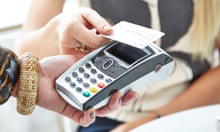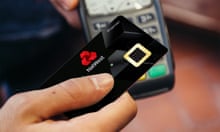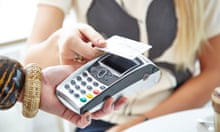Shoppers can make higher-value purchases with their contactless cards after the limit for a single payment rose from £20 to £30.
The increase is likely to broaden the appeal of such payments as more people make them part of their routine.
The use of tap and go technology has enjoyed strong growth over the past year as it has become accepted in a rapidly expanding variety of places – including supermarkets, post offices and public transport.
Contactless payments were introduced in the UK in 2007 for low-value transactions. According to UK Cards Association, more contactless transactions took place during 2014 than the previous six years combined. More than £2.5bn was spent using contactless cards in the first half of this year, the trade body said.
Richard Koch, head of policy at the UK Cards Association, said: “Contactless payments are fast, easy and secure and use the same robust encryption technology as chip and pin. Consumers are increasingly choosing contactless as a way to pay and the new £30 limit will give shoppers and retailers even more opportunities.”
The technology enables customers to pay for goods with a single swipe of their card on a reader, without the need to sign or enter a pin number. There are 58m contactless cards across the UK.
The latest increase to the limit is the third to have taken place. The last increase to the contactless limit was made in June 2012, when £5 was added, taking the limit to £20. Before that, it was raised from £10 to £15 in 2010.
The £30 limit is being rolled out from Tuesday. However, not all retailers will offer the new limit immediately as payment terminals will require software updates. There are more than 200,000 bank-owned terminals, so the upgrading work could take some time.
Concerns have previously been raised about how susceptible contactless cards are to criminals using technology to steal personal details remotely. A recent investigation by the consumer group Which? used “easily and cheaply” acquired technology from a mainstream website to take enough information from cards to place orders for items including a £3,000 TV.
But the UK Cards Association has described instances of fraud on contactless cards as extremely rare, with losses of less than a penny for every £100 spent on contactless – far lower than card fraud generally.
If a contactless card is used fraudulently, consumers are fully protected against any losses and will not be left out of pocket, the association has said. Card providers should reimburse victims of contactless fraud, as long as they have taken reasonable steps to keep their card safe.
The Which? investigation found that one possible solution to foiling fraudsters trying to read a card remotely could be lying in the kitchen. It found that, while it is by no means essential, wrapping a card in tin foil could prevent it from being read.










